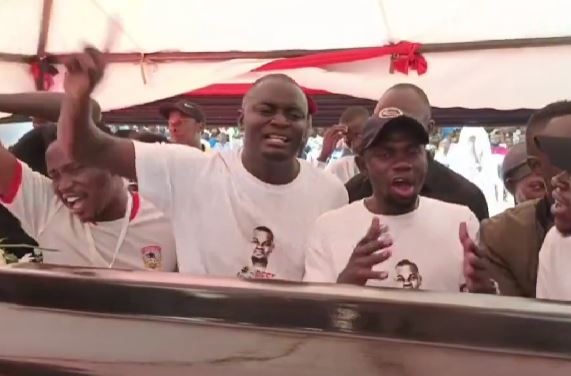
Grief and anger filled the air in Kokwanyo village, Homa Bay County, as students from Pwani University travelled hundreds of kilometres from Kilifi to bid farewell to their former comrade, Albert Ojwang.
In a small white tent where his body lay in a wooden casket, silence fell as the students stepped forward to view his remains. Heads bowed, some wept quietly, others cried openly, overcome with sorrow and disbelief.
Ojwang, remembered fondly as a friend, comrade, and leader, was more than just a familiar face on campus.
To those gathered, he was a brother.
“He was like my brother,” one student said, tears streaming down his cheeks.
The students chanted “Comrades power!”, a solemn cry of unity, defiance, and remembrance. Amid the chants, some clutched each other for support, while others quietly whispered memories they shared with Ojwang during his time at the university.
Ojwang, 31, was born in Kakoth, Homa Bay County.
A teacher and outspoken blogger, he was arrested on June 7 for allegedly posting a defamatory message on his X account. Days later, he died in police custody in Nairobi.
Police claimed he had injured himself in a cell and was rushed to Mbagathi Hospital where he later died.
But a post-mortem examination contradicted that narrative, revealing blunt-force trauma and signs of assault.
News of his death shocked the country and ignited public outrage, with activists, students, and civil society demanding justice.
At Pwani University, Ojwang studied Kiswahili and Religious Studies. But it was his leadership that made a lasting impression.
He was active in the Luo Students Association and participated in several initiatives aimed at uplifting and uniting students on campus.
Even after graduating, Ojwang remained close to the student body, mentoring and maintaining ties with many undergraduates.
His funeral, held at his father's home in Kokwanyo, drew mourners from far and wide — a testament to the impact he had both inside and outside the classroom.
As the sun set over the hills of Homa Bay, students stood shoulder to shoulder, fists raised in the air, chanting one final time: “Power!” Their voices cracked with grief, but their message was clear, Ojwang will not be forgotten.
His memory now lives in classrooms
he once taught in, in the online spaces where he challenged authority, and in
the hearts of those who saw him not just as a student, but as a symbol of
courage and conviction.











